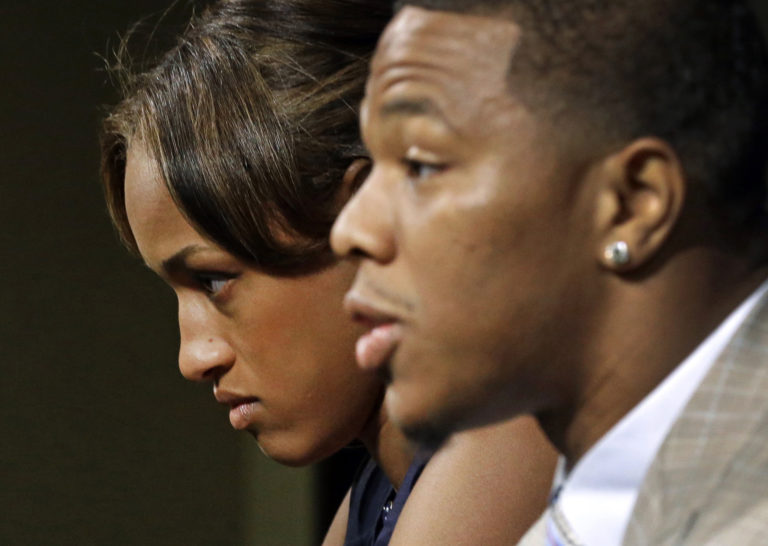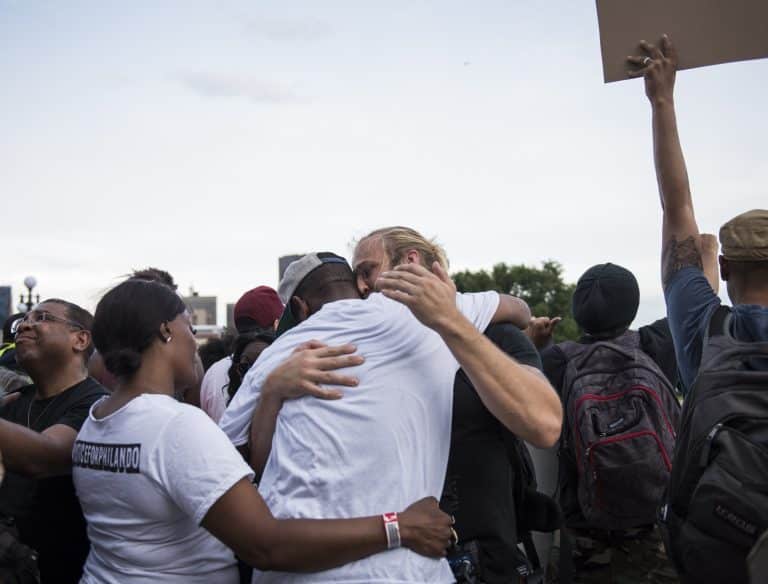
Janay Rice and and her husband, Baltimore Ravens running back Ray Rice, speak during an NFL football news conference on Friday, May 23, 2014, at the team's practice facility in Owings Mills, MD. Image by Patrick Semansky/AP Image..
The Violence of Humiliation
Traffic-baiting videos, shallow television punditry more aimed at filling time than increasing public knowledge, reactionary tweets and Facebook status updates — this is the panopticon of our 24/7 media machine and it is powered by the dirty fuel of humiliation. As of late, it’s been focused on an elevator video of professional football player Ray Rice, punching his then fiancée, now wife, squarely in the face. Rice’s team, the Baltimore Ravens, terminated his contract, and the NFL suspended him indefinitely.
Consequences are critical; they are the raw material of cultural norms and institutional integrity. The NFL is an organization with an outsized influence on American boys and men. Save perhaps NASCAR, no one has the opportunity they do to influence the way their fans think about domestic violence, about masculinity, about love.
So yes, let’s hold the NFL accountable for creating a consistent, clear, and influential policy about domestic violence (a scrappy, innovative young organization called Ultraviolet has taken the lead on this). Let’s push them, not just to create consequences for players who are violent, but also to offer them therapy, and to do so, even when the blinding light of public scrutiny is not shining. As the always-wise Brittney Cooper wrote at Salon:
“The fact that Rice received only a two-game suspension until this video surfaced suggests that the league is more concerned with the optics of Rice knocking Janay Palmer unconscious than addressing the ways that the hypermasculinity of sport perpetuates a culture of violence toward women.”
Let’s push the NFL to go beyond crisis communication or ass-covering policy. Let’s inspire them to think complexly and creatively about what it would look like if they were to leverage their outsized influence on American men to redefine masculinity to be about vulnerability and respect, not toughness and force. (For starters, they could engage organizations like Men Can Stop Rape, who create campaigns like this one aimed at college men.)
So many NFL players, so many men, carry the festering wound of having been abused themselves. As has so often been said, hurt people hurt people. It’s not until we reveal those wounds, examine them, heal them, that we will actually see a shift in male-perpetrated violence of so many kinds.
No amount of humiliation can accomplish that, and in fact, any amount of humiliation will prevent it. People may make themselves feel better as they tweet away about what a monster Ray Rice is, but they are actually increasing injury in the process. A recent study by researchers at the University of Michigan revealed that “the same regions of the brain that become active in response to painful sensory experiences are activated during intense experiences of social rejection.” In other words, humiliation and isolation are experienced as intensely as physical pain. As has been widely documented by researchers, they aren’t emotions that motivate people to be better; they are emotions that make people feel backed into a corner.
I don’t know the wounds that Ray Rice carries with him, but I know they’re there. That’s not to absolve his actions, but it is to attempt to understand them. Our energy is wasted vilifying him; that only serves to separate out the “good guys” from the “bad guys” — an immature dichotomy.
We must ask ourselves: where do the Ray Rices of the world go to speak their own pain before it explodes? Where do men go to testify to the violence they’ve endured and to the resulting humiliation they carry in their own hearts? Where do they go to learn the difficult art of disentangling love from control?
Truth be told, these isolation-busting, truth-telling spaces are few and far between for men. Sometimes they are created in churches, like Glide Memorial, where a group called “Men in Progress” gathers twice a week to share their struggles around managing heartbreaks, big and small. Sometimes they happen in retreat settings, like “Answering the Call of Spirit,” where renowned storyteller and scholar of mythology Michael Meade guides an intergenerational group of men from vastly different class backgrounds through what he calls “the fog” of alienation. Sometimes they happen online, like MaleSurvivor.org, a digital sacred space of sorts where men can type what they haven’t been able to speak. All of these organizations are vastly underfunded.
If we invested more time and money in these efforts and less in social media schadenfreude, the world would be a less violent place for everyone.
The emphasis on healing the wounds of male perpetrators and victims is, of course, not to prioritize it above healing women, who are so often forced to reckon with the generational legacies of violence living in the men they love. It is an and/both, not an either/or. As we celebrate the 20th anniversary of the Violence Against Women Act, it seems like a synchronous time to reassert that the personal is political, and to surface the everyday narratives that make what happened in that elevator both less shocking and more horrifying simultaneously. Let’s use this opening in public consciousness to bear witness to the hashtags #WhyIStayed and #WhenILeft where real women are courageously deepening the conversation, even in just 140 characters.
Just as we are mistaken to vilify or further humiliate Ray Rice, let’s also not use our energy psychoanalyzing Janay Rice or her choices. To pretend we know what’s best for her is disrespectful. She has spoken out. I’d like to believe that even as she doesn’t want to be made into anyone’s symbol, she would support a louder conversation about domestic violence, writ large, if it could protect other women. It’s a way to make meaning of her trauma — a healing prospect in and of itself.
So yes, yes, yes, to consequences. Yes to institutions that think creatively about their opportunity to be a force for cultural transformation. Yes to teaching men how to speak about their own experiences of violence and humiliation, to creating spaces where they can hear one another before they scream with their fists. Yes to victims seizing social media’s power to point out how tragically ordinary this “extraordinary” news story really is. Yes to respecting every woman’s expertise on her own life and her authority to make her own choices. But no to humiliation. It creates social isolation, perpetuates pain, and keeps violence festering in the hearts of wounded men. That’s dangerous for us all.


Share your reflection